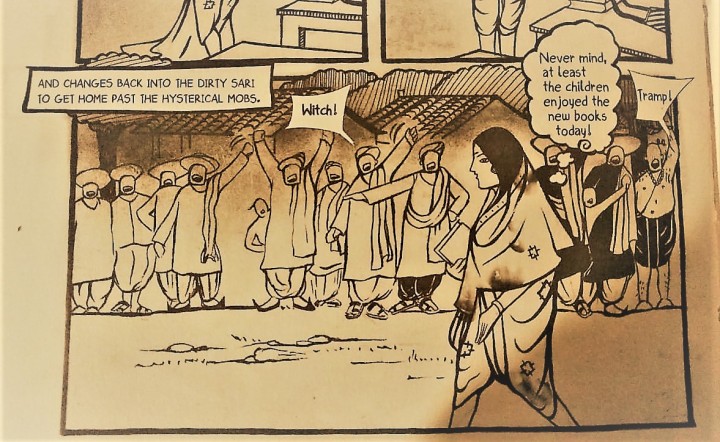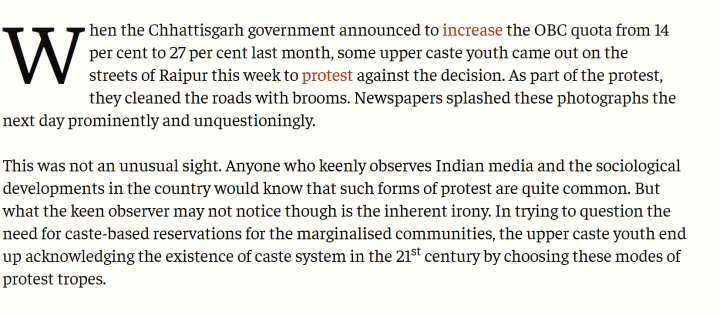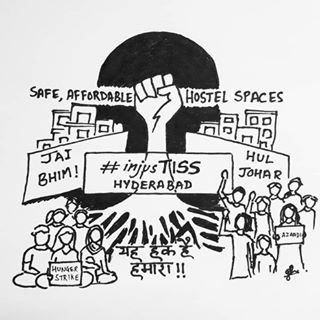Savitribai Phule’s struggle against Brahmanism and patriarchy to educate shudra and dalit girls of her time makes her worthy of national recognition as a true ‘teacher’, rather than a sanitized Brahmin figure notoriously associated with plagiarism. The life and work of the Phules repudiates the elite desire of keeping education ‘free’ of politics. They are a testament to the violent gatekeeping of education by Brahminical forces, and an inspiration for modern campaigns to prevent privatization, corporatism and authoritarianism from taking over public education.
Another 5th September has gone by with the usual ritual of lip-service to teachers and token remembrance of the man anointed by state hagiography as the representative of all teachers— S. Radhakrishnan, — now just another Brahmin statue on a pedestal. This tacky, uncritical reverence for dictated iconography contrasts sharply against the vibrant counter-narrative that reveres Fatima Bibi and Savitribai Phule instead.  These women were social pioneers because they strove for lower-caste and Dalit women to exercise their right to education.
These women were social pioneers because they strove for lower-caste and Dalit women to exercise their right to education.
It stands to reason that in a society and polity structurally oriented to restrict education for vast swathes of its own people, those who struggled to educate the excluded be honored as true ‘educators’ rather than those who were born with the near-exclusive right and social expectation to study and teach. S Radhakrishnan, moreover, is also notorious for plagiarizing from Professor Jadunath Mishra’s thesis ‘Indian Psychology of Perception, Vol I & Vol II submitted to Calcutta University in 1922-23. The fact is that the ‘merit’ so often claimed by the ‘hardworking’ and ‘educated’ elite rests more on the ignorance and exclusion of others than anything inherent in it. Obscurantist Sanskrit texts with a swirling repetition of Brahminical supremacy and absurd claims ringing hollow over centuries of near-nil scientific achievements is the legacy of millennia of the Brahmin intellectualism that S.Radhakrishnan and the position of ‘teachers’ at large has inherited. Kabir, Ravidas, Ambedkar, Savitribai, Fatima, Shahuji Maharaj are prominent for their advocacy and efforts towards education, and none have received their rightful recognition for this role in wider society.

For many communities of not just Dalits but also OBC’s, the Phules— Jotiba and Savitribai— were social rebels and pioneers who were one of the first, in their theory and praxis, to analyze, understand and practically resolve the historical links between educational, cultural, social and economic deprivation of the masses. By opening a school for girls, which included Dalits (disparaged as ‘untouchables’), Savitribai became a living example of resistance to multiple, intersecting and layered planes of oppression.
In her person we find a woman rejecting the patriarchal demarcation and separation of the ‘domestic’ and ‘public’ space, extending her vision far beyond not just the physical walls of her home but the temporal limits of her own time. 
She acted on her imaginative capacity to visualize an assertive, just and equitable female space in society based on their education, despite the dominance that Brahminical ideology and social apparatus exerted on each individual, including her. Along with her husband Jyotiba Phule, who deconstructed Brahminical scriptures and exposed the underlying ideological weaponry in his groundbreaking book Gulamgiri, Savitribai clearly realized the political nature of her efforts to educate women from oppressed classes. It was a challenge to a prevailing ‘moral’ order which was exposed as vested completely in the necessities of patriarchal caste dominance. It was a peaceful and constructive challenge, but also an extremely perilous disruption of society initiated by Savitribai, who undertook it head-on through the stones, abuses and threats rained at her. Her lived experience of being a ‘lower-caste’ woman with the offensive intentions of making her fellow sisters literate showcases the true value of education and the present dangers of commodifying and privatizing the right for which she struggled so hard.

She knew that education enables independence of thought, and critical awareness of the world around us. The emancipatory potential of education for the deprived and marginalized, among which women stand at many intersections, is not limited to financial or economic independence. Education opens the window to see oneself embedded in a larger socio-political matrix, and to question and imagine differently the position one is located at. It opens the pathway to the ‘full reclamation of the human personality’, in the words of Dr Ambedkar, and unlike the Brahminical conception of it as a means to an end, in this context it is the means to freedom, which an end in itself.
The violent guarding of the written and spoken and written ‘word’ (a shorthand for various forms of knowledge) historically mirrors the grueling powerlessness that illiteracy and ignorance has bred in the masses of the country, so much so that I believe it is a crime perpetrated against the people worthy of immense reparations and apology. Even armed resistance becomes near-impossible and futile in a religion wherein even deities seem bound by caste laws! Such a menacing grip on the will and thought can only be broken with alternate streams of thought, which is precisely what an authentic education, and not false mythical propaganda, had to offer.

We get an authentic estimate of the depravity of opposition to Savitribai’s campaign even today when misguided and antisocial savarna youth sweep streets with brooms, or more idiotically still, set themselves ablaze, to “protest” this rightful restoration of rights in the form of reservations in educational and job opportunities. Savitribai’s stand against Brahminical and savarna entitlement to the spoils of social labour transcended her own time in a very real sense, in that she strove to provide for the next generation what was denied to hers. The perpetuity of the Brahmanical ideological apparatus rests very strongly on its claims of being an ‘eternal’ and ‘ancient’ tradition, and it was the very survival of this criminally oppressive system that women like Savitribai imperiled with the mere decision of holding a pen. They showed that a counter-tradition of intellectualism, social equality and human rights was much more Indian than the despicable ethos of ‘matsya neeti’, ‘varna vyavastha’, and ‘karma-dharma’ that bred parochialism, subservience, dejection, and broke the spirit of the masses.
They are pathbreaking teachers for generations to come because the social landscape they were born into has changed only its colors, not its true nature. The long list of tragic and avoidable suicides by Dalit, Adivasi and also OBC students in higher education, the pathetic condition of government schools and the systematic silencing of dissenting voices among students reveals that the Brahminical agenda, guised as a religion and ‘ a way of life’, is alive and well. The explicit statements on the sub-humanity of women and shudras have a living, social existence in virtually every nook and corner of the country, even though the language of original articulation is ‘dead’, as its masters have moved on to the new tongue of power— English.

In these circumstances, we need many more national leaders like Savitribai, Fatima Bibi, Jyotiba Phule and Dr. Ambedkar to take up the mantle of nation-building through education. In the face of concerted attempts to privatize quality education, the cancerous spread of private colleges and coaching centers, and the regressive policies enacted to keep students in a perpetual state of insecurity related to fees, jobs, beliefs, identity, political views and food habits, we must look to an earlier time when these forces had not even this nominal Constitution to stop them, and be inspired to brainstorm new strategies of resistance.
Jai Bhim
This post has used pictures from the graphic novel A Gardner In The Wasteland: Jyotiba Phule’s Fight for Liberty. Drawn and written by Srividya Natarajan and Aparajita Ninan. Published by Navayana.